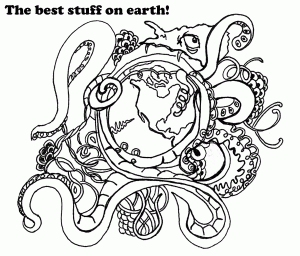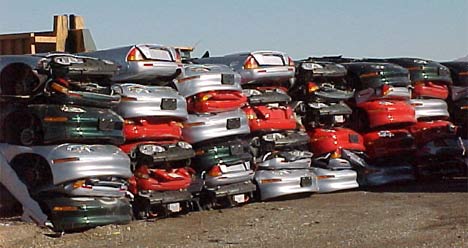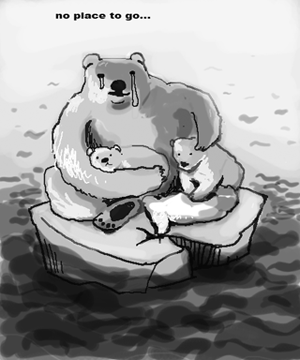This documentary follows the artist Vik Muniz as engages with workers at the world’s largest garbage dump, Jardim Gramacho, on the outskirts of Rio de Janeiro. He turns these pickers of recyclable materials into artistic collaborators, introducing them to the well heeled world of the global art market. Part of the proceeds from the sale of their collaborative work goes back into the social and cultural organizations associated with the dump. While the rationalizations of the artist regarding his detachment from the participants is somewhat problematic, the documentary is not without merit. It manages to provide a view into a subculture, and its associated environmental and economic problems, that is seldom seen internationally. Directed by Lucy Walker.
This 2012 film starring Andy Garcia and Forrest Whitaker is liable to fly under the radar due to its anti-corporate theme, but it is worth a look. The central conflict of this action and suspense thriller is between Ecuadoran peasants and greedy executives who are financing military supression to further their corporatization of water. While Whitaker, as Francisco Francis, is forced into an active role in defending his family, brandishing guns and rocks to kill soldiers, he espouses Ghandian non-violence. Similarly obtuse is the ex-CIA turned radio show host played by Garcia, who is paid $250,000 plus expenses to serve as a mercenary, but somehow comes across as the moral equal of the peasants defending themselves from corporate tyranny. Despite these flaws, the film is a service to moviegoers insofar as its politics are not blandly pro-corporate or fascistic. Other contemporaneous films like the 2012 reflux of the Expendables and Red Dawn are impressively stupid by comparison. It’s refreshing to see films like The Constant Gardner, Blood Diamond, and now A Dark Truth, that mix suspense and action with plausible representations of the world we inhabit. It is a rather dark commentary on contemporary film criticism that the 2012 Red Dawn outpaced A Dark Truth in both the critical and popular ratings of Rotten Tomato. Viewers and critics alike appear to prefer idiotic, xenophobic, and racist movies about an implausible invasion of Spokane, Washington by North Korea to a comparably suspenseful film that is grounded in political realities relating to water rights, human rights, injustice, and corporatization.
In this 2009 film, set in the year 2055, Oscar-nominee Pete Postlethwaite plays an archivist who looks back on the present and asks: Why didn’t we do something about climate change before it was too late? Unlike the rollercoaster thriller “2012”, the anxieties are not so easily diffused at the end of this film.
Not surprisingly, in light of the stark tone of the film, its funding and distribution model was unusual. The film was crowd funded, and its distribution was innovative. The film was made available at whatever venues could pay, leading to a modest but real revenue. Overall the film was not a big moneymaker. But it raises the question of whether the film industry’s conventional funding and distribution model is resistant to the realities of climate change?
 If you are going to see one documentary this year, Tapped may be the one that gives you the most useful information. There are many environmental documentaries that leave one wondering, ‘what can I do that would really change THAT in a meaningful way?’ This isn’t one of them. After all, the message of this invective against bottled water is easy enough to absorb: avoid bottled water. It doesn’t sound like it’s worth 80 minutes, but it is.
If you are going to see one documentary this year, Tapped may be the one that gives you the most useful information. There are many environmental documentaries that leave one wondering, ‘what can I do that would really change THAT in a meaningful way?’ This isn’t one of them. After all, the message of this invective against bottled water is easy enough to absorb: avoid bottled water. It doesn’t sound like it’s worth 80 minutes, but it is.
Colin Beavan and his family set out to minimize their ecological footprint. The details are captured in this documentary. While critics have faulted the project in any number of ways, seeing how one goes about reducing environmental impact is worthwhile. Watching made this viewer realize that he could do better. The negative reception given to the project in American media is an indication of how dangerous it can be to needle a guilty conscience. Beavan made mention of the especially cynical treatment by the New York Times. The NYTimes also made light of Japanese recycling efforts in a 2009 article, which begs the question, why is the Times so reluctant to embrace the green movement?
This documentary directed by Deborah Koons-Garcia is a testament to how well agribusiness and biotech industry have hidden the dangers of recent trends in food technology, gene engineering, monoculture farming, and transgenic Frankenfood.

After California mandated that automakers sell some electric cars, they complied. This documentary is the story of how they produced a popular electric vehicle but refused to sell it, choosing instead to lease it, fight the mandate in the courts, and eventually re-possess, crush, and destroy all the cars.
Today’s concept cars from GM are less interesting than the production cars of 1997 (see below). What’s going on here?
http://www.enn.com/sci-tech/article/38207
All the auto makers want consumers to believe they are doing their best to solve our dependence on oil, but this documentary demonstrates that the profitability of oil has led companies like GM to ignore common sense and extend the oil addiction.
Ironically, as oil prices have risen, and demand for vehicles powered by alternative energy sources has risen, American automobile companies have been struggling to sell oversized SUV gas guzzlers and their market share has fallen. Ford now brags about its Highlander Hybrid (“bold moves”), but Toyota has a half-dozen similar vehicles and passenger hybrid cars also. So while Ford tries to portray itself as leading the way, they are really lagging behind. Who Killed the Electric Car shows how the American auto industry got to this sad state by fighting the inevitable decline of the internal combustion engine.

In the late 19th century corporations were accorded protections as if they were human beings under U.S. law. The Corporation takes a look at the behavioral patterns of these quasi-human entities, and applies conventional definitions of psychological maladies to demonstrate that the state of the modern corporation is very ill indeed.
The Corporation is very useful viewing for anyone trying to get a handle on greenwashing because it is a primer on how corporations became what they are today, and a review of ways that they operate.

This film combines G-rated animal adventure with a relatively soft environmental message. The film ends with a CODA about the dire predictions of the imminent disappearance of summer sea ice in the arctic, necessary for the survival of the film’s animals. The estimated date when sea ice would be gone is 2040. But NASA’s James Hansen revised this figure down to 2012 only a few months after the film’s release. Yipes.
Source: http://www.cnn.com/2007/TECH/science/12/11/arctic.melt.ap/index.html

An Inconvenient Truth
This documentary featuring Al Gore and has won an academy award for the best documentary of 2006.
The award is clearly a gesture of support, and a signal of alarm, rather than a declaration that this particular film is brilliant. While informative, the film begs the question why Gore’s call to action was relatively muted in his years as the Vice President?











 If you are going to see one documentary this year, Tapped may be the one that gives you the most useful information. There are many environmental documentaries that leave one wondering, ‘what can I do that would really change THAT in a meaningful way?’ This isn’t one of them. After all, the message of this invective against bottled water is easy enough to absorb: avoid bottled water. It doesn’t sound like it’s worth 80 minutes, but it is.
If you are going to see one documentary this year, Tapped may be the one that gives you the most useful information. There are many environmental documentaries that leave one wondering, ‘what can I do that would really change THAT in a meaningful way?’ This isn’t one of them. After all, the message of this invective against bottled water is easy enough to absorb: avoid bottled water. It doesn’t sound like it’s worth 80 minutes, but it is. 

